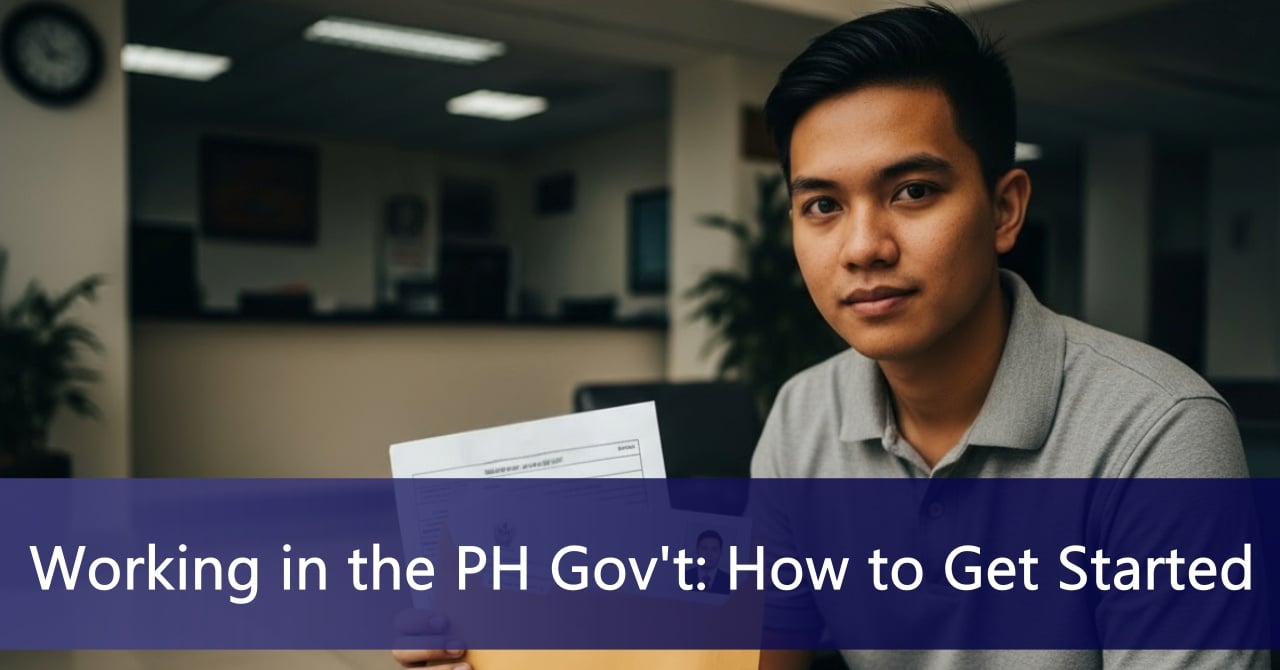Many Filipinos dream of joining government service because it offers stability, clear benefits, and the chance to serve the country directly. But breaking in can feel overwhelming if you don’t know the exact steps. With this goal in mind, here’s a clear map—from checking if you’re eligible to signing your appointment papers—so you can apply with confidence.

Eligibility and Position Types
The first step is knowing if you qualify. Government jobs aren’t one-size-fits-all. Some require Civil Service eligibility, while others accept applicants without it, depending on the nature of the role.
Common employment statuses:
- Regular/Plantilla: Permanent roles with full benefits and security of tenure.
- Casual: For seasonal or limited tasks but may open doors to plantilla roles later.
- Coterminous: Lasts only as long as the appointing authority or project.
- Contractual: Fixed period roles, usually less than a year.
- Job Order: Short-term services without full benefits.
- Consultancy/Contract of Service: Specialist work, often project-based.
Eligibility requirements:
- Civil Service Eligibility: Earned through CSC exams (Professional or Sub-Professional) or granted via special laws (e.g., Bar/Board passers).
- PRC License: Needed for regulated professions like nursing, teaching, or engineering.
- Open roles: Some entry-level or non-plantilla posts don’t require eligibility, but these are limited.
Knowing which category you fall under helps you avoid wasted applications and set realistic expectations about benefits, tenure, and career growth.
Where to Find Vacancies
Most agencies are required to publish their vacancies. Here’s where to start looking:
- Agency websites/HR pages: Departments like DSWD, DOH, and DepEd post job openings with clear requirements and deadlines.
- CSC Job Portal (csc.gov.ph): Consolidates available government positions nationwide.
- Official social media pages: Many agencies now announce vacancies on verified Facebook pages.
Tip: Always double-check the official site or page to avoid scams.
The Full Application Pipeline
Here’s the process, stage by stage:
1. Match Your Qualifications
Agencies strictly evaluate applicants against the Qualification Standards (QS) set by the Civil Service Commission. Review the job posting carefully:
- Education (degree or units required)
- Eligibility/license (CSC or PRC)
- Training hours
- Work experience
Your move: Map your credentials directly to the QS before applying.
2. Prepare Your Documents
Standard requirements usually include:
- Accomplished Personal Data Sheet (PDS)
- Transcript/diploma
- Training certificates
- Employment certificates
- CSC eligibility or PRC license
- Valid government IDs
Your move: Follow formatting rules (file type, naming, size). Many applications get rejected for incomplete or misnamed files.
3. Submit Your Application
Most agencies require submission via email or an online portal. Walk-ins are rarely accepted.
- Follow subject line format exactly (e.g., “Application – Administrative Officer II – Juan Dela Cruz”).
- Submit before the deadline—late applications are automatically excluded.
4. Screening and Initial Tests
- HR screens for QS compliance.
- Some agencies may conduct a qualifying exam. Results are usually emailed.
5. Technical Assessments and Interviews
Expect either or both of the following:
- Technical exam: Skills-based test related to the role.
- Panel interview: Assesses technical know-how and behavioral fit.
Tip: Prepare STAR (Situation-Task-Action-Result) stories tied to your past work.
6. Background and Reference Checks
Agencies may contact your references or conduct background verification.
7. Final Deliberation and Appointment
- The Human Resource Merit Promotion and Selection Board (HRMPSB) deliberates.
- Recommended names are submitted to the appointing authority for final decision.
8. Pre-employment and Onboarding
- Submit pre-employment requirements like medical clearances and NBI/police clearance.
- Attend orientation sessions to learn about your duties, policies, and benefits.
What to Expect by Stage
| Stage | Agency Focus | Your Move |
| Qualification Match | Education, experience, CSC/PRC | Align your credentials to QS |
| Submission | Compliance with rules | Follow file formats and deadlines |
| Testing | Cognitive/technical skills | Practice and review competencies |
| Interview | Technical and behavioral fit | Use STAR stories; know agency mandate |
| Deliberation | Merit-based ranking | Keep communication lines open |
| Pre-employment | Authenticity, fitness to work | Secure clearances, prepare originals |
Practical Tips for Filipino Applicants
- Target roles strategically: If you lack CSC eligibility, apply for non-plantilla roles first while preparing for the exam.
- Mirror the QS in your PDS: Use the same phrasing from the posting to highlight your fit.
- Respect instructions: Treat file-naming rules as part of the criteria.
- Be patient with timelines: Hiring can take weeks or months. Keep your email and phone number active.
Quick Checklist Before You Apply
- CSC certificate or PRC license (if required)
- Updated PDS, diploma/transcript, COEs, and training certificates
- Valid government ID and pre-employment clearances
- Application submitted in correct format and before deadline
- Interview kit: portfolio/work samples, STAR stories
Frequently Asked Questions
Do all government jobs require Civil Service Eligibility?
No. Some entry-level and job order positions don’t require CSC eligibility, but most plantilla (regular) positions do.
How long does the hiring process usually take?
It can take several weeks to months, depending on the agency’s deliberation schedules and number of applicants.
Can I apply to multiple government agencies at once?
Yes. You’re free to apply to several vacancies across different agencies as long as you meet the qualifications.
What happens if my documents are incomplete?
Agencies often reject incomplete submissions outright, so always double-check requirements before sending.
Are government jobs open to fresh graduates?
Yes, provided the role accepts applicants without prior experience. Many entry-level plantilla positions welcome new graduates.
Can I still apply even without eligibility now?
Yes. Consider job order or contractual roles while you prepare for the CSC exam. These roles can help you gain relevant experience.
Closing Thoughts
Joining the Philippine government isn’t just about passing exams or interviews. It’s about discipline, patience, and understanding how the system works. If you follow each step carefully, you’ll not only increase your chances of being hired but also set yourself up for a career with purpose and stability.
